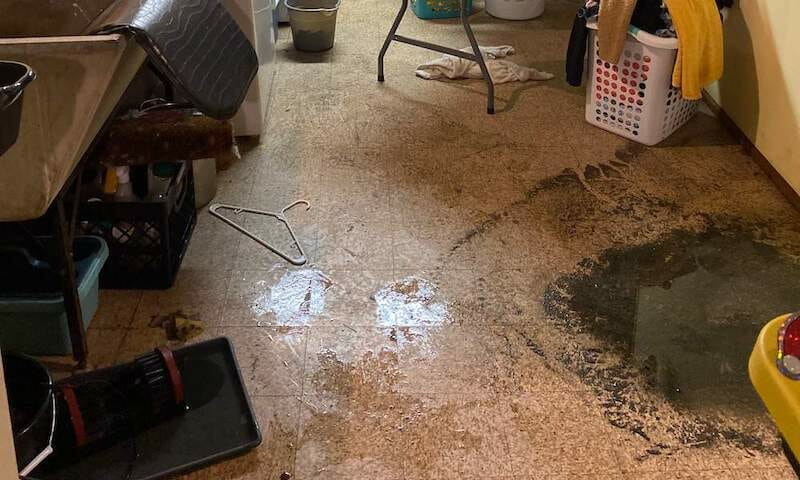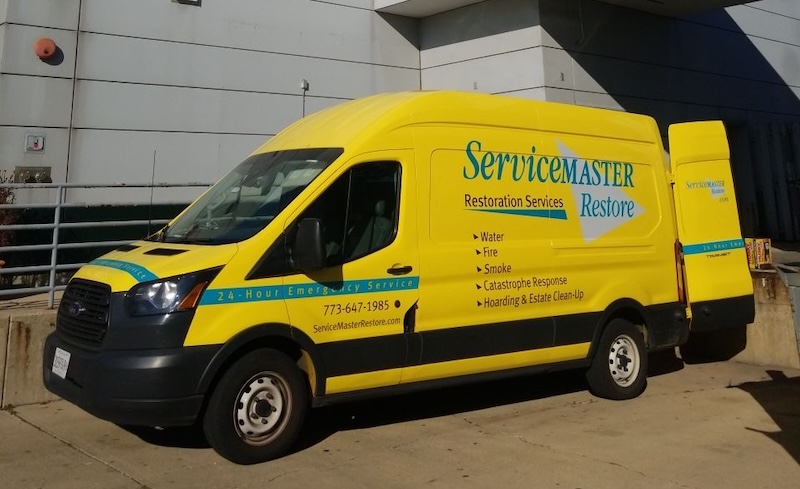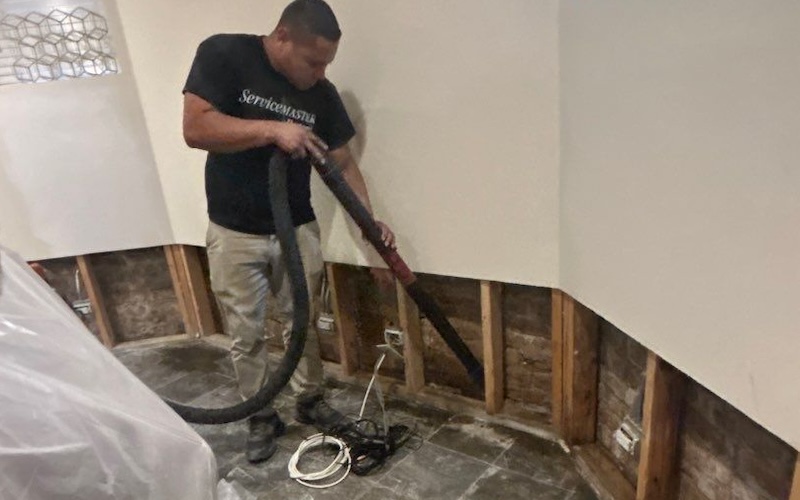Water in your basement can weaken your home’s structure, damage belongings, and lead to mold if not taken care of quickly.
At ServiceMaster Restoration by Zaba, our team brings over 85 years of combined experience helping Chicago homeowners clean up flooded basements.
In this guide, we break down what to do if your basement floods, what causes it, and how to help prevent it from happening again.
Key Takeaways
- Basement water damage needs immediate attention because it can quickly cause structural issues, mold growth, and damage to your belongings.
- To handle a flooded basement, take safety precautions, find and fix the source, remove the water, clean and disinfect the area, dry everything thoroughly, and begin repairs.
- If you’re dealing with a flooded basement, call ServiceMaster by Zaba: 773-647-1985; we respond 24/7 with expert help, using professional tools and techniques to address basement flooding.
Common Causes of Basement Water Damage in Chicago

Flooded basements are a familiar problem for Chicago homeowners—and certain causes come up more often because of the city’s weather, soil, and aging older homes.
Here’s what to watch for in your home:
1. Sump Pump Failure
It’s important to have a functional sump pump in your basement to help mitigate basement flooding when it happens.
But power outages, clogs, and old equipment often lead to sump pump failure.
What to look for: Standing water, a constantly running pump, or unusual noises.
What to do: Check for power and clear out any clogs. If it’s still not working, it might be time for a repair—or a full replacement.
2. Leaky Appliance Hoses
Washers and water heaters are often set up in basements, where cramped spaces and constant use can wear out hoses and connections over time.
What to look for: Water around the base of appliances, cracked or swollen hoses.
What to do: Shut off the appliance and replace old hoses. Braided steel replacements last longer and reduce risk.
3. Cracked Walls or Leaky Windows
Chicago’s freeze-thaw cycle and clay-heavy soil put pressure on basement walls, leading to cracks and leaks over time.
What to look for: Peeling paint, damp spots, or visible cracks in walls or around window frames.
What to do: Seal minor cracks with waterproof cement or caulk. For major issues, contact a basement waterproofing or restoration specialist.
4. Broken Pipes
Burst pipes are especially common during Chicago winters when uninsulated plumbing freezes and splits.
What to look for: Sudden flooding, a musty smell, low water pressure, or a spike in your water bill.
What to do: Shut off the main water valve. Use a pipe clamp for small leaks. If a pipe has ruptured, call a plumber or restoration team.
5. Poor Outdoor Drainage
Flat lots and dense urban construction often mean poor water runoff around Chicago homes.
What to look for: Water pooling near the foundation or saturated soil.
What to do: Clean your gutters and extend downspouts so water flows at least 10 feet away. If puddles keep forming, regrade the soil or install a drainage system.
6. Sewage Backup
Older sewer lines and combined stormwater systems in many parts of Chicago can back up during heavy rain or after a blockage.
What to look for: Foul smells, slow drains, or water backing up from floor drains.
What to do: Avoid contact—sewage is hazardous. Call a certified restoration team like ServiceMaster by Zaba immediately.
Steps to Take When Dealing with a Flooded Basement

1. Shut off Water & Electricity
Before entering a flooded basement, shut off the main water valve if possible and check for signs of electrical hazards or sewage.
Never go in if there’s raw sewage, strong odors, or standing water near outlets.
Wear waterproof boots, gloves, and protective clothing to stay safe.
If the area looks hazardous, wait for ServiceMaster by Zaba to arrive.
2. Take Photos
Before you clean anything up, take photos of the damage – walls, floors, furniture—anything affected.
These will help if you file an insurance claim.
3. Stop the Leak Before Cleanup
Before you begin any cleanup, you need to stop the water from coming in.
If it’s a clear plumbing issue, shut off the main water valve.
But if you’re unsure where the water’s coming from—or it’s not something you can handle—call a plumber or a restoration team like ServiceMaster by Zaba.
Stopping the leak early helps prevent further damage and keeps cleanup manageable.
4. Get the Water Out
Use a shop vac or pump to remove water. Towels and mops work for smaller areas. The sooner the water’s gone, the better.
5. Remove Damaged Items
Get rid of anything soaked—carpet, drywall, insulation. These materials trap moisture and can grow mold.
6. Clean and Disinfect
Wash hard surfaces with soap and warm water.
Disinfect with a bleach mix (1 cup per gallon of water). Use baking soda or vinegar to remove any lingering smells.
7. Dry It Out
Set up fans, heaters, and dehumidifiers to dry out the area.
Use a moisture meter if you have one to make sure it’s fully dry before rebuilding.
8. Start Repairs
Once everything’s dry, replace the flooring, drywall, and insulation.
Wait until everything is completely dry before moving items back in.
When to Call ServiceMaster by Zaba

Sometimes it’s just too much to handle on your own—especially if there’s a lot of water, sewage, or damage you can’t see.
That’s when calling in the water damage restoration pros is the best move.
At ServiceMaster Restoration by Zaba, we’ve helped hundreds of families in Chicago clean up after basement floods.
Here’s what we do:
1. Stop the Water
We find the source—whether it’s a pipe, sump pump, or drainage issue—and make sure the water is stopped for good.
2. Water Extraction
We use high-powered pumps and vacuums to remove water fast.
Then we set up industrial fans and dehumidifiers to dry your space thoroughly.
3. Clean and Disinfect
We clean and sanitize every surface, especially if sewage or dirty water was involved.
4. Repair What’s Damaged
We remove wet drywall, flooring, and insulation—then repair and rebuild everything needed to restore your basement.
5. Prevent Mold
We treat the area to stop mold from growing and deal with any that’s already started.
6. Help With Insurance
We take photos, document the damage, and work with your insurance provider to make the process easier on you.
How to Prevent Basement Water Damage
A few simple checks can help you avoid future problems.
- Check your basement once a month: Look behind furniture and in corners for damp spots or leaks.
- Test your sump pump: Clean it regularly and make sure it works. Add a battery backup in case the power goes out.
- Seal basement walls: Waterproof coatings can help stop moisture from seeping in.
- Clear footing drains: These drains run around your home’s foundation—keep them clear and working.
- Install interior drainage if needed: If you deal with frequent flooding, interior drains can help catch and redirect water before it spreads.
- Replace old plumbing parts: Old water heaters and hoses can burst. Swap them out before they fail.
- Check your roof once a year: Fix cracked or missing shingles and flashing that can lead to leaks.
- Check your washing machine: Replace rubber supply hoses if they’re cracked or over five years old.
- Seal any cracks: Even small cracks can let water in. Patch them early.
- Cover window wells: Use clear covers and keep the drains clear of leaves and dirt.
- Clean gutters: Keep them clear so water drains away from the house.
- Extend downspouts: Make sure water flows at least 10 feet from your foundation.
- Install a curtain drain if needed: These gravel-filled trenches can keep groundwater away from your basement.
- Regrade your yard: Make sure the ground slopes away from your home so water doesn’t collect around the foundation.
Dealing with Basement Water Damage in Chicago? We Can Help!

If your basement has flooded—or you want help preventing future water problems—ServiceMaster Restoration by Zaba is here to help.
We serve homeowners across Chicago, including neighborhoods like Lincoln Park, Logan Square, West Loop, and beyond.
We handle everything from cleanup to repairs, mold removal, and insurance support.
Call us any time, day or night, at 773-647-1985.
FAQs
What are the signs of basement water damage?
Some signs are obvious—like puddles or soaked carpets. Others are easier to miss.
Watch for:
- Cracks in walls or floors
- Flaking concrete or powdery white residue (efflorescence)
- Mold or musty smells
- Discolored spots on drywall or plaster
- Damp air or standing water
- Sinking or uneven flooring
- Warped or crumbling wood
Make it a habit to inspect your basement every month, especially around corners, behind appliances, and near windows or sump pumps.
Catching problems early can save you a lot of time and money later.
What’s the average cost to fix basement water damage?
The cost depends on the size of your basement and how bad the damage is.
On average, water damage cleanup costs run between $2,500 and $5,000.
If your basement is finished or needs major repairs—like new drywall, carpet, or plumbing—the total can be much higher.
The best way to know for sure is to get a quote from an experienced restoration contractor.
Why is water damage in the basement bad?
Water doesn’t just stay put—it can spread to upper floors by seeping into walls and wood framing.
It also creates the perfect conditions for mold, which can spread throughout your home.
What makes Category 3 water so dangerous?
Category 3 water—also called “black water”—can contain bacteria, viruses, and toxins.
It can cause serious illnesses like hepatitis, stomach infections, and skin rashes.
This type of water is often found in sewage backups or stormwater floods.
Can I save personal items from a water-damaged basement?
In many cases, yes. At ServiceMaster by Zaba, we pack out, clean, and restore personal items like clothes, furniture, electronics, and important papers.
Does homeowner’s insurance cover basement water damage?
Usually, yes—if the damage comes from things like broken pipes, failed appliances, or mold caused by a covered event.
Some issues, like sump pump failures or sewer backups, might require special add-on coverage.
Flooding from outside—like a heavy storm or water main break—isn’t covered by regular insurance, but you may be able to get a separate flood policy.
Talk to your agent to review your options.
I found bugs in my basement after a flood—what should I do?
Flooded basements attract bugs like silverfish, spiders, pill bugs, and cockroaches.
Most leave as you clean and dry the space, but some may come back.
You can use pesticides or natural repellents like:
- Diatomaceous Earth: Sprinkle along dry corners and baseboards.
- Cedar: Hang cedar balls or place blocks and chips in corners.
- Peppermint Oil: Mix 10 drops with warm water in a spray bottle and apply to dark, hidden spots.
How do I get rid of that musty basement smell?
Spread baking soda on trays or cookie sheets.
Set out bowls of white vinegar or containers of unscented cat litter (if you don’t have cats).
These will absorb odors in a few days.
What’s that white powdery stuff on my basement walls?
That’s called efflorescence—mineral deposits left behind by water.
Scrub with warm water and a stiff brush.
Follow up with a vinegar rinse, then clean water. If you use a cleaner, make sure it’s safe for concrete and mortar.